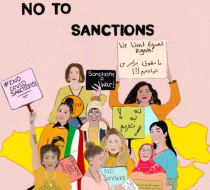Coronavirus: Activists launch ‘digital protest’ to end US sanctions on Iran Favorite
Activists have started an online campaign to pressure US Treasury Secretary Steve Mnuchin to lift sanctions on Iran to help it contain the spread of coronavirus.
Coronavirus: Are US sanctions hurting Iran's response to the pandemic?
The hashtag #EndCOVIDSanctions was used to call on representatives of the US Congress to alleviate the sanctions on Iran, which has been one of the worst affected countries by the pandemic outside of China, where the virus originated from.
The hashtag has been shared thousands of times and has gained attention from all over the world.
The ‘digital protest’ also involved making 80 hours of phone calls to the Treasury Department to demand they take action.
Hoda Katebi, an Iranian-American activist, took to Twitter to draw attention to the situation many Iranians are currently facing.
“Every day that passes and sanctions on Iran are still not lifted, the death toll and number of Iranians infected with Covid-19 rise exponentially. We don’t have much time. Iranians can’t buy or make necessary medical supplies under US sanctions,” she said.
“Researchers predict that if sanctions aren’t lifted, at least 3.5 million Iranian lives will be lost to Covid-19.”
Iran's economy has been crippled by US sanctions, which have also curbed its ability to purchase or access medical equipment or pharmaceuticals on international markets.
"That's because there is no financial mechanism to fulfil those transactions," Sanam Vakil, the deputy director of the Middle East and North Africa programme at Chatham House, told Middle East Eye.
Kate Kizer, the policy director at Win Without War, an organisation of activists working for more progressive US foreign policy, says that the US must change its approach to Iran, particularly as Tehran struggles to cope with the pandemic.
“Covid-19 should be a wake-up call: human security is shared across borders. The old ways of trying to bomb and sanction our way to safety simply do not work in the face of global crises like pandemics and climate change,” she told MEE.
“Even in the best of times, sanctions are deadly, inhumane, and counterproductive. To keep them in place - and worse, impose new ones - during a pandemic is nothing short of monstrous.”
US trade sanctions - re-imposed after Washington pulled out of a nuclear deal with Tehran in 2018 - meant that the Islamic Republic has been unable to purchase medicine from European companies due to European banks' fears that they might be sanctioned by the US Treasury Department for engaging in trade with Iran.
Last year, Human Rights Watch said that “maximum pressure” US sanctions have led to the country being unable to effectively treat cancer patients and rare blood disorders.
Global calls for sanction relief have been raised to allow Tehran to deal with the virus, but Washington insisted that its campaign is not hampering Iran's response to the pandemic.
The UK, China, Russia and Pakistan have all urged the White House to ease the sanctions. Key members of the US Congress have also raised the issue.
Congresswoman Ilhan Omar has recently renewed calls for the US to suspend sanctions against Iran.
Iran’s health ministry said last week that one person dies every ten minutes from Covid-19, as the death toll continues to rise.
Azadeh Shahshahani, the legal and advocacy director of Project South, an organisation that focuses on immigrants’ rights and defending Muslim communities, highlighted the impacts of US sanctions on Iranian people.
“These sanctions have been devastating for the Iranian people. And much more so in the midst of this pandemic where more than 2,200 people have died. The country is facing shortages of respiratory assistance devices and basic medical equipment such as gloves and masks,” she said.
“The lifting of sanctions now is undoubtedly a matter of life and death. The mobilisation to call on the US government to lift the sanctions is a hopeful sign of the US public's outrage at this administration's callous brutality in the face of a humanitarian disaster.”
Congresswoman Omar called for an end to sanctions against Iran before the start of the outbreak.
"This makes no sense. Sanctions are economic warfare," Omar tweeted in January. "They have already caused medical shortages and countless deaths in Iran.
"You cannot claim to want de-escalation and then announce new sanctions with no clear goal. This is not a measured response!"
Iran’s death toll has surpassed 2,000, as government officials have launched an urgent appeal for life-saving medicines and equipment.
Iranian health ministry official Alireza Vahabzadeh said on Wednesday that the total number of Iranians infected with the coronavirus has climbed to 27,017.
Medical and public health workers have been under immense pressure, particularly with the lack of equipment and resources.
Washington last week announced two new sets of measures blacklisting companies that it accused of buying Iranian oil and petrochemicals.






